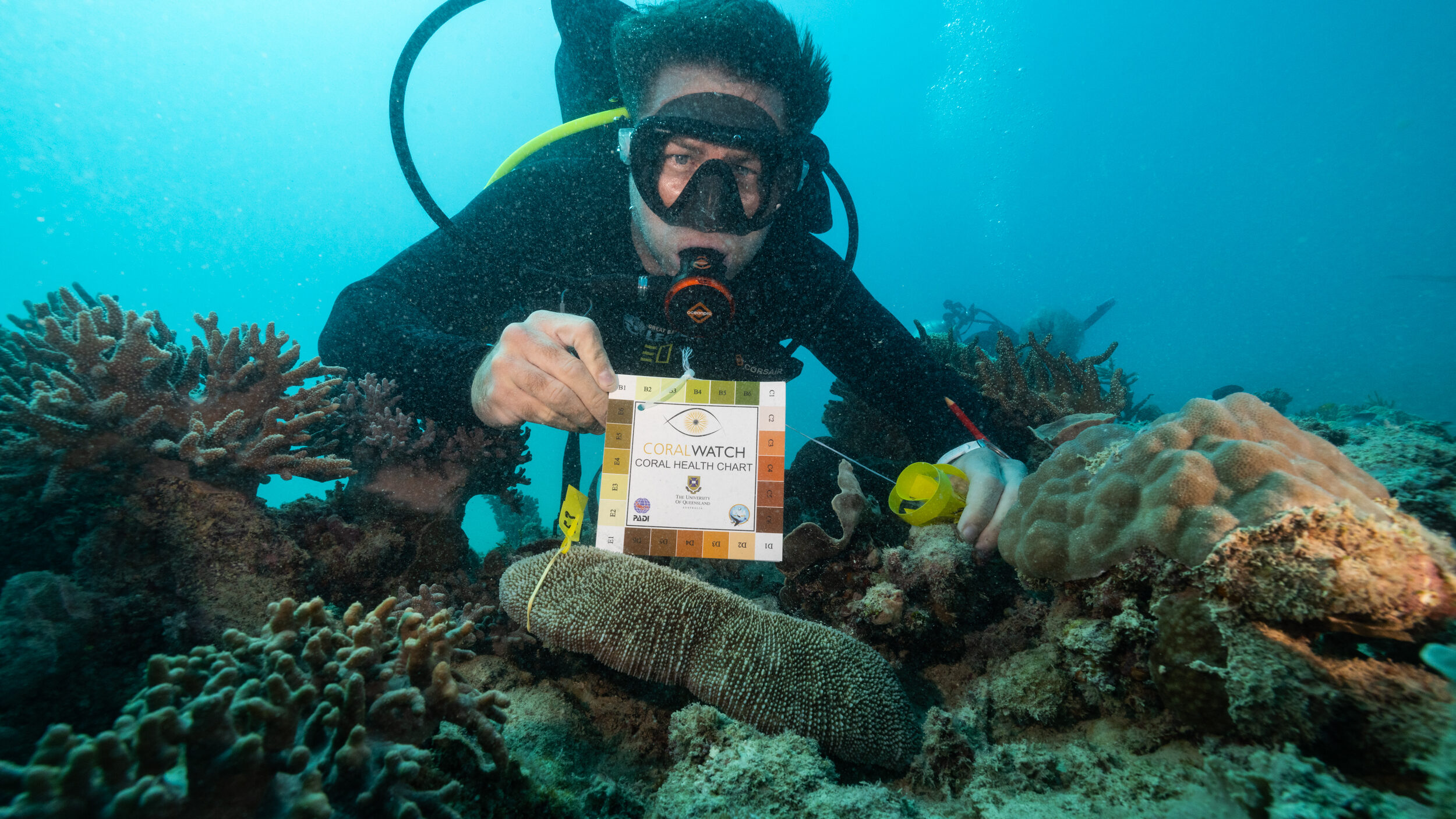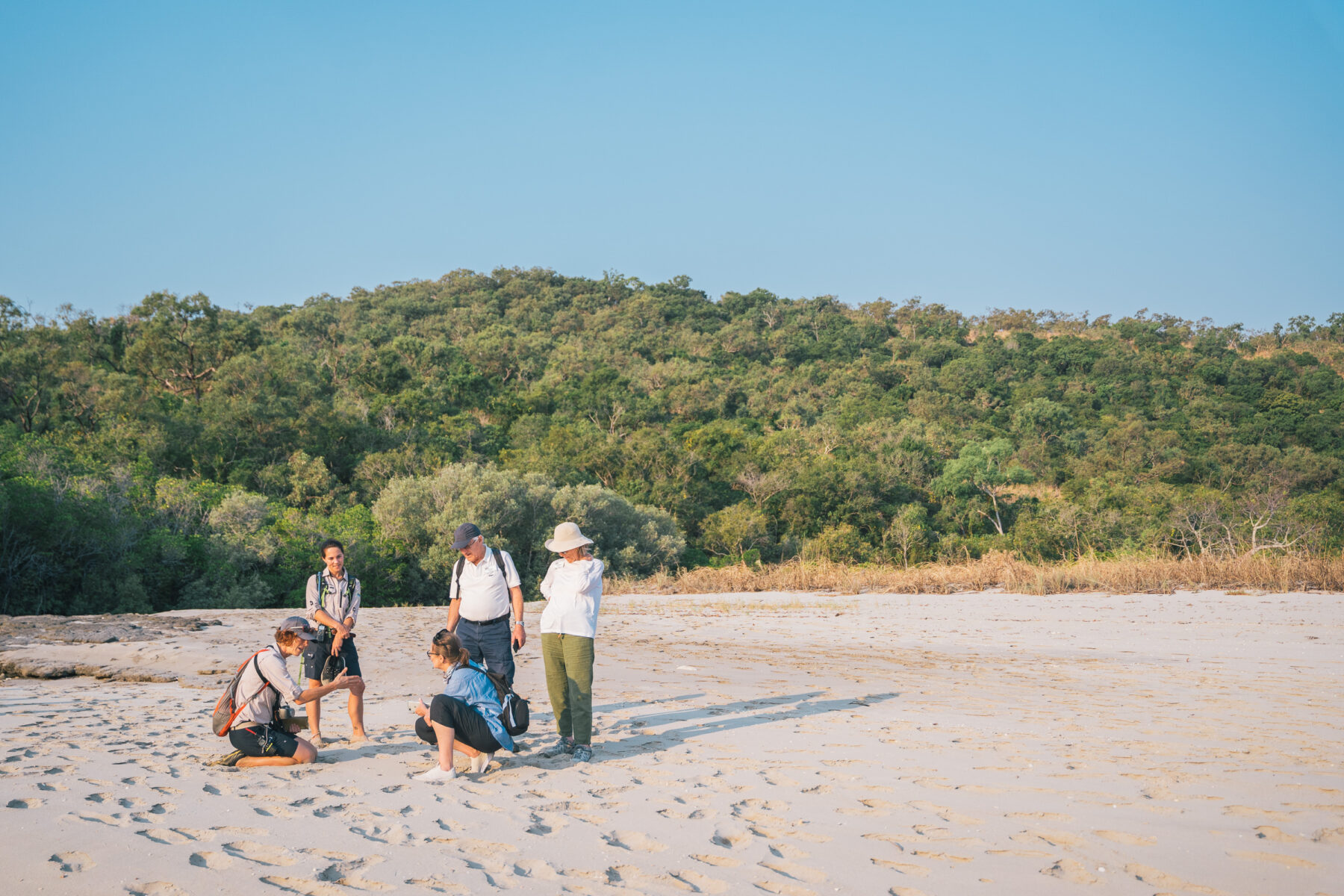Sustainable voyages with Coral Expeditions

This article is brought to you by Coral Expeditions.
This might sound cliche, but in practical terms it’s about supporting local artists by purchasing pieces for your home, working with conservationists on monitoring marine life, and simply being open-minded and respectful to people and their environments.
When travelling with adventure cruise specialist Coral Expeditions you can experience all of this, and travel with purpose. Here’s how:
Support artists
The Tiwi Islands, 80 kilometres north of Darwin, are one of Australia’s art epicentres and journeys there inevitably focus on meeting creators.
One of the oldest and most diverse art hubs in the country is Bathurst Island’s Tiwi Designs and it is included on Coral Expeditions’ Cape York & Arnhem Land (Art Themed) tour. At Tiwi Designs you will discover ironwood carvings of ceremonial poles, traditional ochre paintings and headdresses.


Other tour highlights include going ashore at Maningrida to purchase hand-painted textiles and visiting Elcho Island Art Centre, where you’ll find banumbirr (poles depicting a Yolngu creator spirit), sculptures, yidaki (didgeridoos) and jewellery from more than 200 Yolngu artists.
Passengers will also see rock art on Stanley Island, part of the Great Barrier Reef Marine Park, and, back onboard, join workshops with internationally recognised Torres Strait artist Brian Robinson.

Coral Expeditions’ passengers can also learn about the magnificent rock art of the Kimberley region, on the new Art and Culture of the Kimberley and Tiwi Islands voyage. The 10-night journey showcases rock-art galleries that date back more than 40,000 years and feature Wandjina and Gwion Gwion motifs.
Coral Expeditions commercial director Jeff Gillies says the company has developed strong connections with the Indigenous peoples of Cape York, the Torres Strait and Arnhem Land, and artist visits have meaning.
“When we’re ashore, we facilitate small group interactions that are really authentic,” Gillies says.
“We immerse ourselves into that culture, sit side-by-side with the artists, sometimes participate in workshops with them, so people get a connection and culture…”


Get back to nature
Slightly less remote but still rugged and off the tourist trail is South Australia’s Flinders Island, another Coral Expeditions’ excursion where deep connections with people and place are prioritised.



The island, about 35 kilometres from the Eyre Peninsula, is privately owned by the Woolford family, who have lived there since the late 1970s. The third-generation owners run a merino sheep farm, harvest abalone, and are establishing a safe haven for native species such as the hooded plover and little penguin.
The Woolfords hope to eradicate feral cats, exotic black rats and house mice from the island, so they can one day introduce threatened mammal species to prevent future extinctions.

You can learn about the project when you join Coral Expeditions’ 10-day Wild Islands of South Australia voyage. The company’s visits contribute to the Woolford’s conservation efforts, while also giving guests the chance to taste green-lip eyrewoolf abalone straight from the water, and spot sea eagles and shearwaters from unspoilt beaches.
Become a citizen scientist
Having pioneered expedition cruising on the outer Great Barrier Reef, it’s no surprise Coral Expeditions is now offering citizen science experiences. In June 2021, after four decades touring the reef, the company launched its first citizen science journey in partnership with Great Barrier Reef Legacy. The focus is on the world’s first Living Coral Biobank, which is about safeguarding all 800 known species of hard coral. Guests aboard the small expedition ship, the aptly named Coral Discoverer, can contribute to Legacy’s work during the Citizen Science on the Reef voyage by logging marine species on snorkelling surveys to rarely visited reefs and atolls.


Other opportunities to play ‘scientist for a day’ include visiting Fitzroy Island’s Turtle Rehabilitation Centre and Lizard Island Research Station. With legitimate sustainable practices being implemented around the world, citizen science is also gaining traction.
“People have this innate human desire to connect, to understand and to make a difference,” Gillies says. “It’s not just a taste test, it’s ‘I want to be a part of this on a deeper level’.

Along with Coral Expeditions’ hands-on opportunities, travellers can deepen their understanding of the reef and its challenges during talks by guest lecturers.
But don’t fret, there’s plenty of time for fun, with a highlight being a dive at John Brewer Reef, home to the Museum of Underwater Art.
Be a conscious traveller
When travelling sustainably it’s important to choose your tourism operators wisely. You can avoid greenwash (when companies market themselves as being sustainable but are not) by researching a company’s eco credentials before booking a holiday.
When it comes to ships, the most sustainable way to travel is aboard smaller vessels. They can also reach intimate communities and offer authentic interactions. Gillies says it’s about considerate operating practices and mindful travel, such as offering lectures prior to shore excursions so guests have a greater understanding of where they’re visiting and what’s expected of them.
“What’s happening to the environment through evolution is actually a big part of what we watch and interpret and teach as we’re going,” Gillies says.



On the surface, travellers aboard a Coral Expeditions’ vessel may notice there’s no plastic, the food has been sustainably sourced from local producers, tour leaders turn off engines in sensitive areas, and donations are made to community schools. The company has also supported communities by adorning their vessels with traditional art.
Behind the scenes, there are low-emission outboard engines, while, moving forward, the company is trialling solar and electronic power on its tenders. Perhaps above all else though, sustainable tourism on a Coral Expeditions’ voyage is about protecting the environment long-term, by travelling with respect to people, culture, history and nature.
This article is brought to you by Coral Expeditions.
To book call 1800 079 545 or +61 7 4040 9999, or visit www.coralexpeditions.com.
All Australian Geographic Society members receive $500 savings on ANY Coral Expeditions cruise




